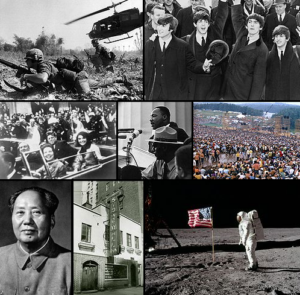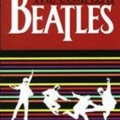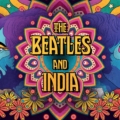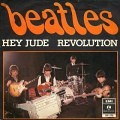- From Faith Current: “The Sacred Ordinary: St. Peter’s Church Hall” - May 1, 2023
- A brief (?) hiatus - April 22, 2023
- Something Happened - March 6, 2023
 After reading my post on LA’s legendary radio station KHJ, commenter @Hieronymus wrote,
After reading my post on LA’s legendary radio station KHJ, commenter @Hieronymus wrote,
This is fascinating, Michael. We are roughly the same age and while I’ve been obsessed with the Beatles and 60s culture since I hit double figures, I only really started digging DEEP into the 60s (aside from the Beatles) around 20 years (I know, ONLY 20 years ago, ha!) but what I soon became aware of was how necessary that deep digging was to really understand the world I grew up in. I think we came into this world at the start of the slowing down of whatever the hell it was that started in the mid-50s in America and then bounced back and forth across the Atlantic for a while and reached its peak around 1967-69. I’m not impartial enough to discern how much that period still resonates in the world today beyond obsessives like myself, but its echoes were the ever-present and pervading backdrop of my formative years even before I had any understanding of what it was or what it meant – which is probably why I remain obsessed.
Wonderful comment. This is probably the closest anybody’s ever come to answering the question I get asked occasionally: “Mike, why do you still blog about The Beatles?”
The Beatles are both a concentrated form of “whatever the hell it was that started in the mid-50s in America…”—you can see that working in them as people, and in every single step of their story—and a great entree into many other aspects of it. The Beatles lead everywhere. Like you, @Hieronymus, I felt the absence of the Sixties profoundly as a backdrop to my growing up. I’m working on a piece for my memoir called “Something Happened,” because that’s how it felt in the 70s, something BIG had happened, but I had just missed it, and was getting instead the overripe and mostly used up leavings of it, especially culturally. Sometimes that really worked out (Apocalypse Now explains something essential about Vietnam that living through the real day-to-day Vietnam War could not; comedy was better in the 70s because it takes time for a new set of norms to be digested), but most of the time it felt unfair and deflating. And then the 80s came along and systematically attacked every aspect—not of the idealistic, interesting, compassionate, often quite practical 60s, but of the silly 70s that came after. If you grew up after Reagan, it seemed you had to choose which side you were on. Art or money? Weed or coke? Tie-dye or coat and tie? Sex with strangers or no sex until marriage? Atheist or Mass in Latin? It’s a bogus choice, but it felt real, and I know a lot of people still trapped in it.
As to whether that era still resonates, I think one could argue that the entire conservative movement in the U.S. is an attempt to roll back what’s happened since Brown v. Board of Education in 1954; the invention of the Pill (early 50s); massive post-secondary education (beginning with the G.I. Bill, but really hitting its stride in the massive student populations throughout the West in the late 60s); women’s liberation; gay liberation; racial identity being translated into international anticolonialist solidarity and political action…these are all parts of “whatever happened” which don’t simply resonate today, they are what is happening today. The Sixties are present in our present in a way that the 1930s or even 2010s are not, and throughout the West we are still very unsure whether we like or approve of the massive sexual, artistic, political, and cultural energies that the Sixties unleashed—or what to do with them regardless of our opinion. The only comparable decade is, I think, the 1920s, and technology has made the 60s last much longer and hit much harder than the 20s ever did.
For example: in 2003, before my friend was sent to Afghanistan as an Army Ranger, they were all sat down and played the 1966 movie The Battle of Algiers. That was a forty-year-old movie. Soldiers being sent to Vietnam in 1966 were not forced to watch Howard Hughes’ WWI melodrama Wings before they deployed; the idea is absurd. The Sixties were/are still current, still applicable, and not just in Pontecorvo’s movie, but in the “special forces” glamor created in the Kennedy years, and the modified Howze Board-developed air-cav doctrine we employed over there.
What made the Sixties happen can be approached from a million different angles. For example, it’s highly unlikely that The Beatles would’ve happened without the end of National Service in 1960. The whole Sixties scene in the UK was built on that, and the flood of young working-class Brits into art schools. The cultural flowering that happened on both sides of the Atlantic from 1945-80 was based on lots of things that created feedback loops. First, there were macro-factors like birth rates, access to education and either a fantastically strong economy (U.S.) and/or a strong commitment to the welfare state (U.K.), which leads to a huge middle-class market for pop culture. These macro-factors result in lots of individual actions, like John/Paul/George/Ringo becoming fascinated by American rock and roll, deciding to chuck straight jobs for it, and being able to make a living at it while they’re honing their skills.
At some point, the cycle reverses, in that genius individuals seem to amp the culture as a whole; the macro-factors draw the best, most exciting people into the arts, and the arts give the era a kind of brilliance and leading quality that later eras have lacked. If you lived through the 80s, you remember the culture heroes turning from writers, artists and musicians to…bond traders? Corporate raiders? Some of this is the macro-trend of the aging Baby Boomers, but money-people simply were not able to enliven the culture in the same way artists were. But Lennon felt it! In those last interviews, he and Yoko burble about the benefits of money. That’s a signal that the forces that had been in charge since 1955 or so were fading. The drug culture had soured as behaviors commenced in the Sixties began to take their physical and mental toll; AIDS stopped the sexual revolution cold; and so forth.
It’s very difficult for me to look at much about American culture today and say it is objectively better than it was then; I think a high-water mark of sorts was reached. And even the things that are unquestionably better, like racial/sexual/gender tolerance, have their roots in that period. (The assertion of identity and personhood that is “choosing one’s pronouns,” for example, is a very Sixties thing to do.) Many of the things that are objectively worse—the consolidation and strip-mining of culture; the reemergence of Christian ethno-nationalism; a paranoia and loathing around human sexuality; a seemingly permanent Gilded Age ruled by the absolutely worst people—all seem to have their birth in the post-Sixties period, and often call back to an imagined pre-Sixties period.
I will believe until my dying day that those forces @Hieronymus summed up—we’ll call them “The Sixties,” and date them from 1954-73, beginning with Brown and ending with the Oil Crisis/end of the draft/Watergate—were a good thing. A great thing. Maybe even a unique happenstance in the history of human civilization. I am convinced that I live in Santa Monica because, in 2005, I could still see traces of that Sixties culture here. In the soft drugs, the New Age/Eastern stuff, the poster shops on the Venice boardwalk…in California, the Sixties still live, and sometimes even thrive, and that’s why I’m here.
And why my mind turns to the Beatles, those guys “up in the crow’s nest,” spotting the future.






Great piece Michael. I think you touched on so many great points.
“I think one could argue that the entire conservative movement in the U.S. is an attempt to roll back what’s happened since Brown v. Board of Education in 1954; the invention of the Pill (early 50s); massive post-secondary education (beginning with the G.I. Bill, but really hitting its stride in the massive student populations throughout the West in the late 60s); women’s liberation; gay liberation; racial identity being translated into international anticolonialist solidarity and political action…these are all parts of “whatever happened” which don’t simply resonate today, they are what is happening today”
This is so true, and so disturbing. All the great social advances made then are being erased, or trying to be.
I also think that there definitely was something special about the Beatles, and the music from that period, because it is still being listened to. Young people love the Beatles.
IMO, no music from the 80’s on, has had that kind of influence. I can’t even think who from the current crop of popular music, people will still listen to 50 years from now.
I am 58 (59 next month). I have always felt I missed out on the greatest musical period in history. I often say I was born ten years too late.
This is so insightful, Michael, and articulates much of what I also believe so well – bravo! I look forward to reading that memoir
It was just as exciting as you might imagine. I was 11 when the Beatles came to America. Magical is another word to describe it. My first musical crush was Paul McCartney. I felt so lucky that I wasn’t born too early where that love might have been for Fabian or later for David Cassidy. My Mother and I also bonded with the Beatles. She was totally besotted with John Lennon. At first I thought she was just sharing my joy, but then realized she actually had Beatlemania also. I was a bit puzzled how an older lady of 37 could be caught up in it all. Just pure fun and great joy.
“If you lived through the 80s, you remember the culture heroes turning from writers, artists and musicians to…bond traders? Corporate raiders?”
‘Supermodels’ (sigh!)
“I felt the absence of the Sixties profoundly as a backdrop to my growing up. I’m working on a piece for my memoir called “Something Happened,” because that’s how it felt in the 70s, something BIG had happened, but I had just missed it, and was getting instead the overripe and mostly used up leavings of it, especially culturally. ” Oh wow, this is exactly how always felt as someone who was born in 1959. Lumped in with “the baby boomers” but I experienced the 60’s only as a child. I always felt like I’d missed out on all the great experiences and we were just left with the dregs. At the same time, the 60’s were highly formative for me.
I agree that we’re still grappling with the legacy of the 60’s. The current Christian nationalist movement is definitely a reaction to the social and cultural forces unleashed in the 60’s. It’s kind of hard to believe people are still resisting these things, even young people.
That’s quite a quote from JohnandYoko about making money being art. Oooookaaaaay. Sounds like the ultimate selling out to me. 🙂
@Alba, I know I read that “money is art” quote somewhere, but I can’t seem to find it, and the only close one is Andy Warhol’s ““Making money is art. And working is art. And good business is the best art.” So on the (not small) chance I’m mistaken, I’m going to take that out of my post.
Followed by heroin chic supermodels and today a glutton of fast fashion clothing encouraged by popular music, fashion designers and the media. All destined for the bottom of the ocean. Yet fashion constantly harks back to that extraordinary period of time, such was its impact. We can even identify what year and on what album the Beatles were working on simply by looking at what clothes they wore and how long their hair was, or bearded or not bearded. That is almost impossible today!
There are lots of ways to study the many transformative changes from the mid 1950s to the late 1950s, and I am interested in all of them. But the search for some kind of impossible, essential moment or idea is tantalizing, too. The Beatles seem like a pure expression of that ineffable something that makes that time so alluring.
For Hunter S. Thompson, it was San Francisco in ’64-’65:
“It seems like a lifetime, or at least a Main Era — the kind of peak that never comes again. San Francisco in the middle sixties was a very special time and place to be a part of. Maybe it meant something. Maybe not, in the long run… but no explanation, no mix of words or music or memories can touch that sense of knowing that you were there and alive in that corner of time and the world. Whatever it meant…
There was madness in any direction, at any hour. You could strike sparks anywhere. There was a fantastic universal sense that whatever we were doing was right, that we were winning…
And that, I think, was the handle — that sense of inevitable victory over the forces of Old and Evil. Not in any mean or military sense; we didn’t need that. Our energy would simply PREVAIL. There was no point in fighting — on our side or theirs. We had all the momentum; we were riding the crest of a high and beautiful wave…
So now, less than five years later, you can go up on a steep hill in Las Vegas and look West, and with the right kind of eyes you can almost see the high water mark — that place where the wave finally broke, and rolled back.”
I meant, late 1960s. &^%$#@! I also am ambivalent about mythologizing the 60s; there was plenty of bad music, the heroes all had flaws, it wasn’t nearly as beautiful or clear as it looks like from our vantage point. But it was still special, and some of the hard-won gains from that era are making 2023 better. But others (the 1965 Voting Rights Act, for instance) have been eviscerated.
Thank you for writing this. I have been thinking about the unique feel for the 1960s for a while but comparisons to the 1930s and 1980s or even more recent years were illuminating.
I think in cultural and political sense, we are closer to the 1930s than the 1960s, but it’s hard to see it because people began to censor memories of the 1930s as soon as the post war years started. Compare any movie from the 1930s that was remade in the 1950s for an idea of how that censorship worked. (Though a lot of movies from the 1950s are more dark and uneasy than later films and television set during that time would hint at, continuing this cycle of self censorship.)
With the 1960s, the changes that happened were overt, not directly connected to economic depression, and more people were alive and still are making it harder to forget, though there is still an ongoing battle of how to remember them, but there are distinct events that everyone has to mention.
I haven’t done a survey or anything, but I think more bands and musical acts from 1980s still exist now, than those from the 1960s did in the 2000s or even the 1980s. Which means that they don’t have the same kind of trapped in amber quality that those from the 1960s do, you’ve seen them age, go through phases, come backs etc. It also makes it harder for the younger generations to approach the back catalogues. They span decades, where do you even start. It’s all too present and too mutable.
I saw this joke tweet from the talented cartoonist of Haus of Decline:
The Marx Brothers represent the four major male archetypes: Wiseass, Moron, Italian, Blank Slate
It made me wonder if this is how non-Beatle fans (or maybe fans who are only preoccupied with John) regard the Beatles.
John: Wiseass
Paul: Moron
George: Italian
Ringo: Blank Slate
I think this is just my brain looking for patterns in random noise, though.
Love this, @Baboomska. I’m definitely Italian.
I grew up in the 60’s and 70’s; I’m turning 65 soon and because of that, and having lost my mother last year, I have been very nostalgic. I really can’t tell you what it meant, growing up during that time, only what it meant to me. There’s a lot I don’t remember, but I do recall growing up with black and white images of war – all the time – on the TV. Later, I learned that it was in Vietnam, and it was not popular, but in my suburban world no one went to war that I knew of, and no one protested. But what I absorbed as a kid was that there were remarkable things going on all the time. I knew about women’s lib, bra burnings, we knew that Anita Bryant was wrong about homosexuals, and that people of all colors were equal, though I only saw white people (except when going into the city to see my grandparents). There was just this sense in the air that exciting things were happening while we lived our ordinary lives.
I wanted to be a hippy. By the time I was old enough to know what a hippy was, it was too late, but in high school we wore bright colors, stripes, crocheted tops, bell bottoms, said things like “far out” …later, we learned about marijuana, though I didn’t try it until I was 18. Underlying everything was the music, the soundtrack! I was talking to my sister recently, and wondering how did we get our awareness about everything, because our parents didn’t talk about current events much. She said ‘I think it was the music’. Yeah yeah yeah! While I was only 4 when The Beatles were on Ed Sullivan and don’t know if I saw them, their music was everywhere, for years. I remember my neighbor blasting “Don’t Let Me Down” over and over – I’m sure it drove the adults crazy but I liked it. We had TV but what was most prevalent in our lives was the radio; it was always on, at home, on transistors, in cars, and we just soaked up all those sounds – The Beatles, Dylan, all the protest music. Then there were the Monkees and later the Partridge Family and yes, the Brady Bunch. Well, I was the middle girl of three, like Jan. For some unknown reason I don’t remember having a lot of records, but when I was in high school I asked for The Beatles red and blue albums for Christmas. Then came Pink Floyd….
So I wish I knew how to sum up, or how to put into words what it was like growing up during that time. But it influenced me in so may ways and still does. I took LSD numerous times after I graduated high school, as well as many other drugs and alcohol. I felt I had just missed out on the excitement, but the substances were easy to get. I’ve now been clean and sober 33 years, around the same amount of time as Ringo. In later times in my life, I became an activist, helped with community organizing, marched in many marches, worked at non profits (including with kids who were in gangs) became a social worker, and am now a therapist. I wanted to change the world in a big way but now content myself with helping individuals. And here I am revisiting some of my past, and especially all that great music.